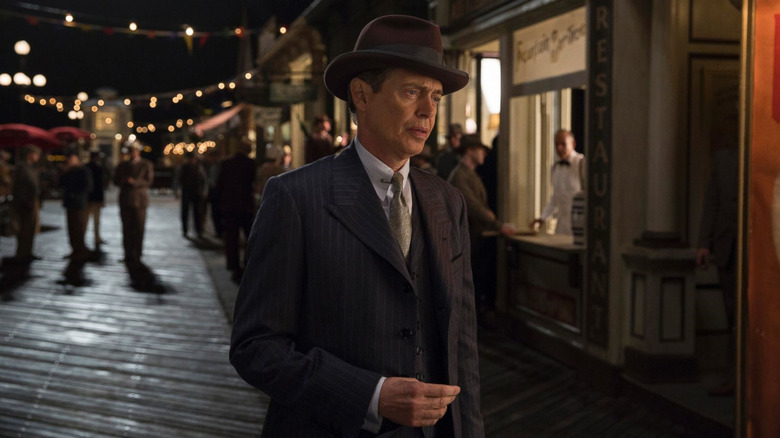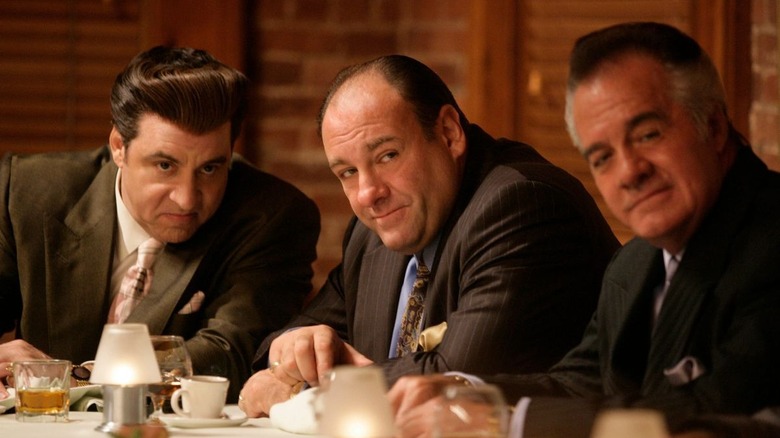Boardwalk Empire's Creator Saw It As The 'Flip Side' Of The Sopranos
Upon the end of HBO drama "The Sopranos," with the falsetto notes of Journey's "Don't Stop Believin'" still hanging in the air, executive producer and writer Terence Winter was searching for his next project. The massively popular mafia-centric show had concluded at the top of the TV heap, even called "the greatest pop-culture masterpiece of its day" by Peter Biskind. Its complicated leading man Tony Soprano (James Gandolfini) was more than the head of an organized criminal clan; he was a husband and a father living in the suburbs, complexities "The Sopranos" explored thoroughly over its six seasons.
Already an Emmy Award-winner for his work on "The Sopranos," Winter was quickly hired by HBO to develop a new series that would fit right in among the network's showy big-budget genre pieces like "Game of Thrones." Upon reading Nelson Johnson's 2002 book "Boardwalk Empire: The Birth, High Times, and Corruption of Atlantic City," Winter quickly realized that it was really a gangster story with politician Nucky Thompson at the center — and it would make a great focal point for a new series. But "Boardwalk Empire" wasn't a retread of the Soprano saga, though the showrunner considers the two related beyond their New Jersey settings. Winter explains the connection to Esquire:
"What made it interesting for me is that I had just spent eight years of my career telling a story about the end of organized crime basically on 'The Sopranos,' and this was literally the beginning of organized crime. Prohibition was the single event that made organized crime possible — it made millionaires out of criminals overnight — so it was really the chance to explore the flip side of 'The Sopranos.' These are the events that conspired to create the world I had just spent the last eight years writing about."
Gray moral landscapes all around
A period drama every bit as violent as the Tony Soprano story, "Boardwalk Empire" centers around Atlantic City politician Nucky Thompson, played by Steve Buscemi. Seeing enterprise within the national restrictions of Prohibition, Thompson quickly ascends to notoriety in the bootlegging business and interacts with tons of historical figures (and characters based upon them), giving the series creator a spacious sandbox to play in. Winter elaborates with Esquire:
"And the ability to do it as a long-running series, where you get to spend dozens of hours with these characters who were really in their infancy, was just irresistible. You get to meet young Al Capone before he became Al Capone. You get to meet a young Lucky Luciano and these guys still trying to figure out who they were."
Al Capone (played in the show by Stephen Graham) and Lucky Luciano emerged from Chicago and New York gangland, jungles every bit as violent as the North Jersey landscape where the crime families ruled in "The Sopranos" – families whose real-life inspirations, notably, got their start during Prohibition. Crafting pro rum-runners wasn't any more daunting than writing the likes of consigliere Silvio Dante. Per Winters:
"Even with a guy like Al Capone, you're going to see moments of humanity there. You're going to see him with his kid or with his brother dying. And even as horrible of a person as he was, you're going to feel something for him. It was certainly true with Tony Soprano. It's just incredible how you start to shed tears for people who you otherwise wouldn't have given two thoughts about."
Whether by mafia boss having panic attacks or a Chicago gunman teaching his deaf son how to fight, the key to writing scoundrels and knaves across any series, Winters asserts, is tangibility.

